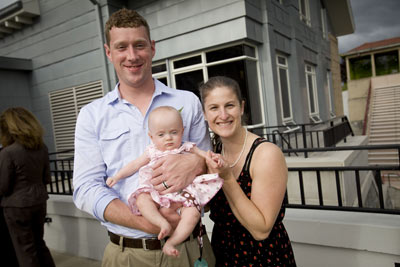CARE Fund aids record number of families, seeks donations
By Nancy Doolittle

Last year at this time, everything was going according to plan for Stephen Anderson, a cook at Robert Purcell Community Center, and his wife, Erica, who worked at the Statler Hotel in the front office. A high school dropout when he first began working at Cornell, Anderson had just one more year to go to receive his B.S. in sociology from the College of Arts and Sciences. His wife was pregnant with their daughter.
Then the unexpected happened, and the couple found themselves applying to the Cornellians Aiding and Responding to Employees (CARE) Fund to help with their expenses.
The baby, Emma, was born at 26 weeks, three-and-a-half months premature. Emma spent the next 81 days in the Crouse Hospital in Syracuse, while Anderson continued going to school and he and his wife traveled daily to see her.
The CARE Fund assists employees experiencing financial hardship with one-time assistance up to $1,500. Funded entirely by Cornell community donations, it helps faculty and staff who have experienced a sudden financial hardship due to an unforeseen or unavoidable event, such as a house fire, medical emergency or job loss. All full- or part-time employees holding a benefits-eligible position and employed at Cornell for at least six months are eligible to apply.
"The staff handling our CARE Fund application made the process of applying as easy as possible," said Anderson. "They helped us with the paperwork and the funding itself helped us with the cost of gasoline for the drive between Syracuse and Ithaca. It was a difficult time, but it would have been much more difficult without the funding we received."
Since July 1, 2011, more than 70 members of the Cornell community and their families have been helped with financial crises through the CARE Fund -- an unusually high number that can be attributed in part to the floods caused by Hurricane Lee last September.
Not counting the flood applications, the CARE Fund Committee distributed more than $18,000 to employees in need this past year.
But the CARE Fund itself now needs replenishing, and the committee asks the Cornell community to once again respond to that need. All of the CARE Fund support comes through donations from staff, faculty and students.
"The people who we've been able to help often have nowhere else to turn, and this money has been a true blessing for them. Emergencies such as these are always unexpected, very emotional, and can cause a devastating financial burden," said Beth McKinney, chair of the CARE Fund Committee.
"The CARE Fund helped us live as normal a life as possible," said Anderson -- while his wife recalls quizzing him in the hospital for his Spanish class. Both are grateful for all the support they received from Cornell, not only through the fund but also through collections in their departments. Emma is now 9 months old, and though still small, healthy in every way. And Anderson, who just graduated from Cornell, hopes to use his degree to help others overcome the challenges of their past.
If interested in helping to support the fund, visit https://www.hr.cornell.edu/life/support/care_fund.html.
Media Contact
Get Cornell news delivered right to your inbox.
Subscribe